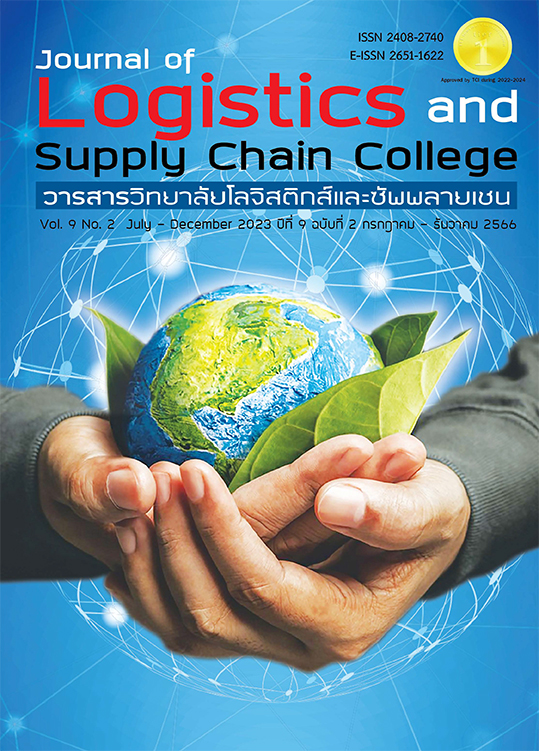ความต้องการการท่องเที่ยวที่เป็นมิตรของนักท่องเที่ยวชาวมุสลิมที่มีอิทธิพลต่อความ ตั้งใจในการเดินทางท่องเที่ยวไปยังแหล่งท่องเที่ยวที่ไม่ใช่เฉพาะชาวมุสลิม
DOI:
https://doi.org/10.53848/jlscc.v9i2.262793คำสำคัญ:
การท่องเที่ยวที่เป็นมิตรกับนักท่องเที่ยวชาวมุสลิม, ความต้องการของนักท่องเที่ยว, แหล่งท่องเที่ยวที่ไม่ใช่เฉพาะชาวมุสลิมบทคัดย่อ
งานวิจัยฉบับนี้มีวัตถุประสงค์เพื่อ 1) ศึกษาความต้องการของนักท่องเที่ยวชาวมุสลิมสำหรับการท่องเที่ยว MFT 2) ตรวจสอบปัจจัยความต้องการของนักท่องเที่ยวชาวมุสลิมที่ส่งผลต่อความตั้งใจในการเดินทางท่องเที่ยวไปยังแหล่งท่องเที่ยวแบบ Non-MTD และ 3) ตรวจสอบอิทธิพลของจังหวัดภูมิลำเนาของนักท่องเที่ยวชาวมุสลิมในบทบาทตัวแปรกำกับ เก็บรวบรวมข้อมูลจากกลุ่มตัวอย่างจากนักท่องเที่ยวชาวมุสลิมที่อาศัยอยู่ในพื้นที่ 14 จังหวัดภาคใต้ จำนวน 723 คน ด้วยแบบสอบถาม วิเคราะห์ข้อมูลเชิงปริมาณด้วยการวิเคราะห์สถิติเชิงพรรณนา ได้แก่ ความถี่ ร้อยละ ค่าเฉลี่ย และส่วนเบี่ยงเบนมาตรฐาน และสถิติเชิงอนุมานด้วยการวิเคราะห์สมการถดถอยพหุคูณ ผลการวิจัยบ่งชี้ว่านักท่องเที่ยวชาวมุสลิมมีความต้องการสำหรับการท่องเที่ยว MFT อยู่ในระดับมาก ผลการวิจัยจากการวิเคราะห์สมการถดถอยพหุคูณพบว่า การท่องเที่ยว MFT ส่งผลต่อความตั้งใจในการเดินทางไปเยือนแหล่งท่องเที่ยวแบบ Non-MTD อย่างมีนัยสำคัญทางสถิติ รวมทั้งอิทธิพลของภูมิลำเนาในบทบาทตัวแปรกำกับเช่นเดียวกัน โดยในส่วนของข้อเสนอแนะ การท่องเที่ยว MFT เป็นปัจจัยสำคัญของการพัฒนาศักยภาพทางการท่องเที่ยวสำหรับการรองรับนักท่องเที่ยวชาวมุสลิมในอนาคต ซึ่งการท่องเที่ยวที่เป็นมิตรกับชาวมุสลิมอาจเป็นส่วนหนึ่งของแผนธุรกิจการท่องเที่ยวเพื่อส่งเสริมโอกาสในการเติบโตทางธุรกิจ
เอกสารอ้างอิง
สำนักงานสถิติแห่งชาติ. (2561). สถิติศาสนา ศิลปะ วัฒนธรรม. ค้นเมื่อ 10 ตุลาคม 2564, จาก: http://statbbi.nso.go.th/staticreport/page/sector/th/04.aspx.
สถาบันฮาลาลมหาวิทยาลัยสงขลานครินทร์. (2554). ธุรกิจสปาฮาลาล. ค้นเมื่อ 22 ตุลาคม 2564, จาก: http://dmhost2.psu.ac.th/~halinst/th/knowledge-th/.
Aji, H. M., Muslichah, I., & Seftyono, C. (2020). The determinants of Muslim travellers intention to visit non-Islamic countries: a halal tourism implication. Journal of Islamic Marketing, 12(8), 1553-1576.
Carlson, K. D., & Herdman, A. O. (2012). Understanding the impact of convergent validity on research results. Organizational Research Methods, 15(1), 17-32.
Choe, Y., Kim, H., & Joun, H.-J. (2019). Differences in tourist behaviors across the seasons: The case of Northern Indiana. Sustainability, 11(16), 4351.
Cuesta-Valiño, P., Bolifa, F., & Núñez-Barriopedro, E. (2020). Sustainable, smart and Muslimfriendly tourist destinations. Sustainability, 12(5), 1778.
Hanafiah, M. H., & Hamdan, N. A. A. (2021). Determinants of Muslim travellers Halal food consumption attitude and behavioural intentions. Journal of Islamic Marketing, 12(6), 1197-1218.
Hanafiah, M. H., Maek, A. A. A. A., & Zahari, M. S. M. (2021). Muslim Tourist Behaviour and Intention to Revisit non-Muslim Countries: The Role of Muslim-Friendly Tourism (MFT) Attributes. International Journal of Religious Tourism and Pilgrimage, 9(1), 165-177.
Jeaheng, Y., Al-Ansi, A., & Han, H. (2019). Halal-friendly hotels: Impact of halal-friendly attributes on guest purchase behaviors in the Thailand hotel industry. Journal of Travel & Tourism Marketing, 36(6), 729-746.
Jermsittiparsert, K., & Chankoson, T. (2019). Behavior of tourism industry under the situation of environmental threats and carbon emission: Time series analysis from Thailand. International Journal of Energy Economics and Policy, 9(6), 366-372.
Kamassi, A., Manaf, N. H. A., & Omar, A. (2020). The need of international Islamic standards for medical tourism providers: a Malaysian experience. Journal of Islamic Marketing, 12(1), 113-123.
Liu, Y.-C., Li, I.-J., Yen, S.-Y., & Sher, P. J. (2018). What makes Muslim friendly tourism? An empirical study on destination image, tourist attitude and travel intention. Advances in Management and Applied Economics, 8(5), 27-43.
Musa, A., Halim, H., Khalidin, B., & Ibrahim, A. (2021). What Determines Muslim-Friendly Tourism in Aceh. Jurnal Iqtishadia, 14(1), 81-106.
Nawawi, M. S. A. M., Abu-Hussin, M. F., Faid, M. S., Pauzi, N., Man, S., & Sabri, N. M. (2019). The emergence of halal food industry in non Muslim countries: a case study of Thailand. Journal of Islamic Marketing, 11(4), 917-931.
Putra, M. F. S., & Tucunan, K. P. (2021). The Concept of Halal Tourism and The Fulfillment of Muslim Tourist Needs in Halal Tourism. Halal Research Journal, 1(2), 56-62.
Rasul, T. (2019). The trends, opportunities and challenges of halal tourism: A systematic literature review. Tourism recreation research, 44(4), 434-450.
Said, M. F., Adham, K. A., Muhamad, N. S. a., & Sulaiman, S. (2020). Exploring halal tourism in Muslim-minority countries: Muslim travellers’ needs and concerns. Journal of Islamic Marketing, 13(4), 824-842.
Septianto, F., Chiew, T. M., & Thai, N. T. (2020). The congruence effect between product emotional appeal and country-based emotion: The moderating role of countryof-origin. Journal of Retailing and Consumer Services, 52, 101916.
Sudarsono, H., Shidiqie, J. S. A., & Tumewang, Y. K. (2021). The Impact of Religiosity and Knowledge on the Intention of Young Muslim Generation toward Halal Tourism in Indonesia. Tourism and hospitality management, 27(2), 255-272.
Suhartanto, D., Dean, D., Wibisono, N., Astor, Y., Muflih, M., Kartikasari, A., Hardiyanto, N. (2021). Tourist experience in Halal tourism: what leads to loyalty. Current Issues in Tourism, 24(14), 1976-1990.
Taherdoost, H. (2016). Validity and reliability of the research instrument; how to test the validation of a questionnaire/survey in a rsearch. International Journal of Academic Research in Management, 5(3), 28-36.
Ulfy, M. A., Haque, A., Karim, M. W., Hossin, M. S., & Huda, M. (2021). Tourists Behavioral Intention to Visit Halal Tourism Destination: An Empirical Study on Muslim Tourists in Malaysia. International Fellowship Journal of Interdisciplinary Research, 1(1), 1-18.
Wannasupchue, W., Othman, M., Abidin, U., Ishak, F., & Mohamad, S. F. (2019). Current trends and opportunities for halal restaurants in Thailand: A conceptual framework. International Journal of Academic Research in Business and Social Sciences, 9(1), 235-247.
Yamane, T. (1973). Statistics an Introductory Analysis. 3rd Edition. New York: Harper and Row.
Yen, H.-P., Chang, J.-W., Ho, K.-C., & Hung, H.-K. (2022). Foreign Muslim Workers’ Perspectives of the Basic Needs of Muslim-Friendly Tourist Services: An Empirical Analysis of a Non-Muslim Destination. Security and Communication Networks, 2022, 1-17.



